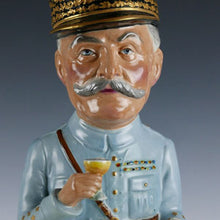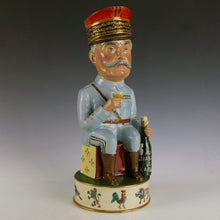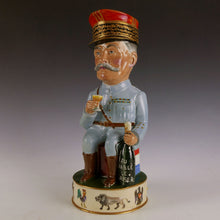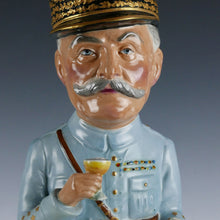Marshal Foch Great War Toby Jug, 1918
- Regular price
- £1,050
- Sale price
- £1,050
- Regular price
-
- Unit price
- /per
Adding product to your cart
Height: 29cm (12in)
One of the series of Toby Jugs representing Allied leaders and commanders designed by the political cartoonist Sir Francis Carruthers Gould (1844-1925) and for the British ceramics manufacturer Wilkinsons Ltd., produced at the Royal Staffordshire Pottery, Burslem, Stoke-on-Trent between 1915 and 1920, and retailed by Soane & Smith, Oxford Street, London.
The Marshal Foch toby jug limited to a production run of 500.
The designer Sir Francis Carruthers Gould was born in Barnstaple and worked at the Stock Exchange where he sketched the members and illustrated notable events in the financial world. In 1887 he became a contributor to the Pall Mall Gazette, before transferring his allegiance to the Westminster Gazette on its foundation and subsequently acting as assistant editor. Frequently grafting his ideas onto subjects taken from Alice’s Adventures in Wonderland, and the works of Dickens and Shakespeare, Gould exercised his craft with a kindly satire from which bitterness and cynicism were notably absent. He was knighted in 1906.
Read more
Marshal Ferdinand Jean Marie Foch (1851-1929) earned a reputation as an aggressive, even reckless commander at the First Battle of the Marne, and in the Flanders, and Artois campaigns of 1914-1916. He became the Allied Commander-in-Chief in 1918 and successfully coordinated the French, British, American, and Italian efforts into a coherent whole, deftly handling his strategic reserves. He played a decisive role in halting a renewed German advance on Paris in the Second Battle of the Marne, after which he was promoted to Marshal of France. On 11 November 1918 Foch accepted the German request for an armistice. He advocated peace terms that would make Germany unable to pose a threat to France ever again. Foch considered the Treaty of Versailles too lenient on Germany and as the Treaty was being signed on 28 June 1919, he declared: "This is not a peace. It is an armistice for twenty years". His words proved prophetic: the Second World War started twenty years and 64 days later.








